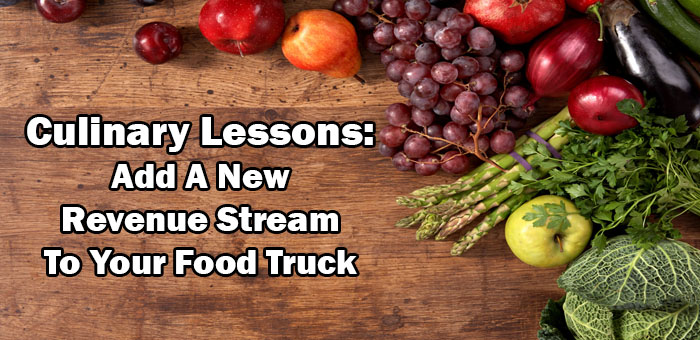If you are like most food truck owners you have a love for cooking that is coupled with a love for sharing your food with others. Use these traits to increase your business in your local area. Sharing your knowledge can turn into a profitable business by offering culinary lessons.
Whether you offer cooking classes at your food truck, commercial kitchen or simply have an in-home kitchen ideal for the setup, you can offer culinary lessons in a niche area of cooking or offer basic and advanced cooking techniques. While leading such classes is often a lot of fun, it has to be looked at as an extension of your food truck business.
Culinary Lessons Can Provide A New Revenue Stream
Determine what kind of cooking classes you will teach
If you are an expert in a certain type of food or technique, this would be a good place to start. For example, if you are an expert in Italian cooking, start with these types of classes or if you are an expert bread baker, offer classes in these techniques. Make a list of your skills, even skills that don’t seem important to you at first. It’s quite possible that once you go through the list, you will see ample opportunity to offer a variety of classes.
Know the law
Check with your local department of health as well as your county clerk’s office to find out if you’ll need any type of special license to provide this type of service. Due to the fact that you are not selling the food, it is unlikely that you will need to have an inspection like your truck. Offering culinary lessons in your clients’ homes can also be an option.
Gather equipment and set up
Be sure that you have everything you will need to teach your class. If your students will be cooking, be sure to have enough for everyone. You won’t need five mixers, for example, but you will need to have ample mixing bowls, ramekins, measuring cups and spoons. If your kitchen isn’t properly equipped, see if you can offer classes through a local retail store (think Sur la table or William Sonoma). This can be good marketing for them and gives you a place to do your cooking. If you can’t find a store to work with you, you may be able to rent the space from your commercial kitchen.
Develop your promotional materials
Add your culinary lessons to a brochure that can be handed out at your truck’s service window. Also include this service to your website. If you offer other services, such as catering, then be sure to incorporate all of these in your promotional materials.
Plan well
You might find that your first culinary lessons will go along so well you don’t need a plan. That being said, creating a syllabus and making notes for yourself will help to ensure that you hit all the points you want to make. Don’t plan every class to the minute, but having general points you want to go over will make teaching easier. It will also help the class go smoothly. (see the list below for tips on creating a class syllabus)
Start small
Once you get interest in your first culinary lessons; you’ll need to decide if these will be a series of classes or a one-time offering. This will help you get your feet wet. Allow yourself to try new things and help you keep your nerves down if you are nervous about your new venture.
The following will help you create a syllabus for your own culinary lessons.
- Theory before Practice. When teaching people how to cook who may not be very skilled at it, have never cooked before or have very limited knowledge, it’s a good idea to start at the beginning. When you first start a cooking class, your students have to know the fundamentals of cooking. These basics of cooking can include the type of pans you will be using in your class, why you use certain utensils and detailed explanations of various cooking techniques. You will also want to teach them the rules of the kitchen, appliance safety and knife safety. Go over what your plans are before you actually let them cook.
- Prepare Handouts. Every good culinary lessons needs handouts. It should include information and reminders of important concepts you want them to remember. It should also include the recipes you will be showing them how to make. Try to get these done before your class even starts.
- Start Small. You don’t want to throw your students into a practical cooking lesson by having them cook an elaborate 5 course meal. Start with small dishes with limited ingredients. As you advance from beginner dishes to more challenging ones, you can include useful cooking tricks.
RELATED: Revenue Streams Don’t Have To End At Your Service Window
The Bottom Line
Food truck vendors have limited resources so use them wisely. Not only will offering culinary lessons expand your reach within your market, but it will create a new revenue stream for your mobile food empire.
Do you offer culinary lessons? How have they helped your food truck business? Share your thoughts on this topic in the comment section or social media. Facebook | Twitter




